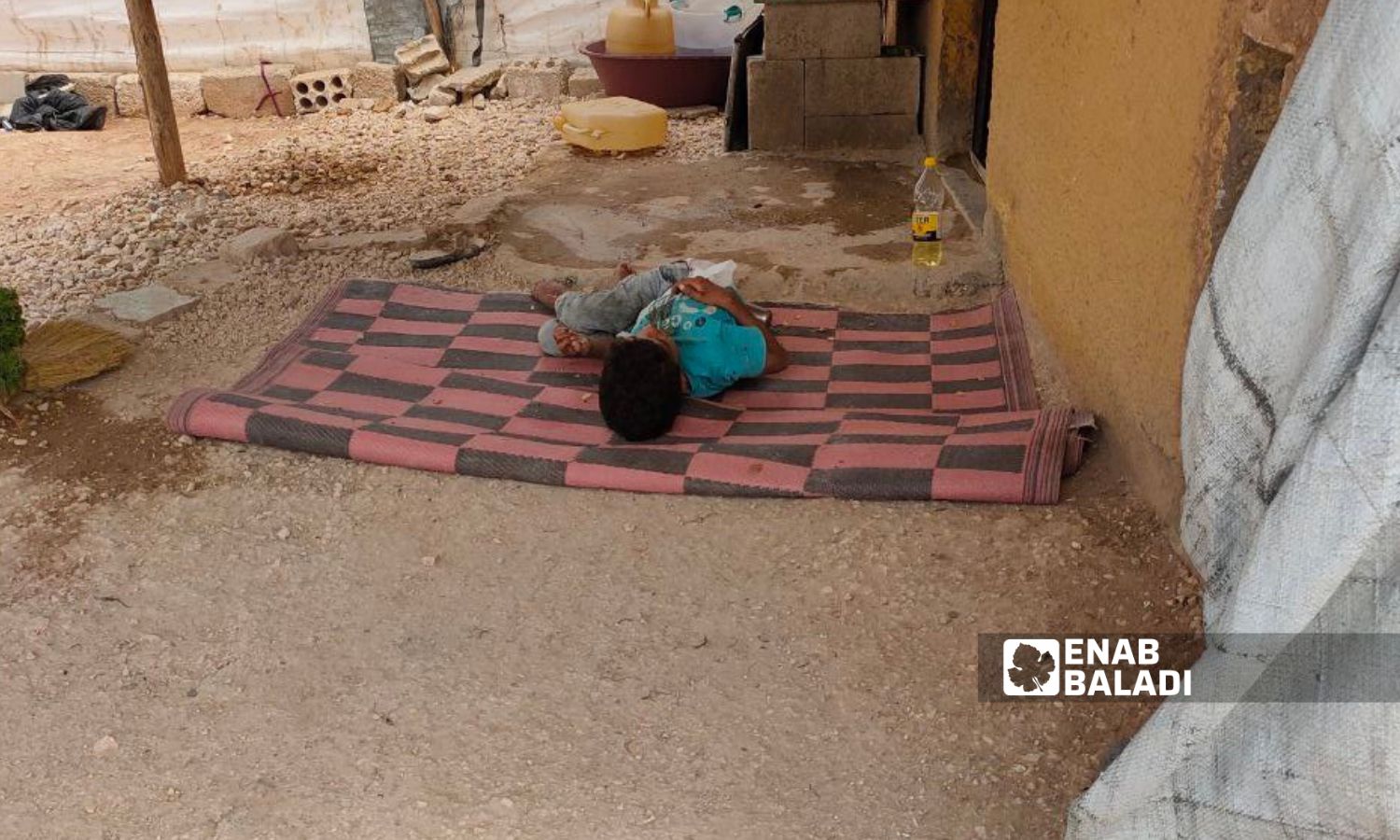



Al-Hasakah – Majd al-Salem
The 66-year-old Mohammad Ali, a resident of Ras al-Ain camp, northeast of al-Hasakah, has been checking with the offices of the organizations operating in the camp for several weeks, seeking support to prepare a walkway connecting his sick wife’s tent with the bathroom, which is about 20 meters away from her.
The wife suffers from a mobility disability that forces her to use a wheelchair, but the infrastructure and roads in the camp do not take into account her special situation, which makes her movement within the camp “extremely difficult and tiring,” the husband told Enab Baladi.
He added that the camp roads are full of medium and small stones scattered everywhere, as there are no paved roads that facilitate the movement of wheelchairs, which made going to the toilets one of the most embarrassing and disturbing things for people with disabilities in the camp.
With the advent of winter, matters become more complicated and difficult due to the formation of pools of water and mud, which makes it almost impossible for patients to move in a wheelchair and forces their families to carry them from one tent to another or to toilets and other service facilities.
According to what Enab Baladi learned from other residents of the same camp, people with disabilities living in the camp suffer from a lack of support and attention, whether from organizations or from the authorities supervising the camp.
The matter is limited to distributing some tools, such as wheelchairs, crutches, and other tools, some of which have been damaged and are no longer usable after about two years of distributing them.
The camp residents complained that the activities for children organized by the organizations inside the camps are limited to healthy ones, as it is rare for them to organize any recreational activity for children with disabilities.
Enab Baladi contacted several organizations working in the camp, including the Khabur Association and the Ashna Organization, to find out about people’s complaints about neglecting people with disabilities, and not paying attention to their suffering. However, the two parties refused to provide any media clarifications or statements in this regard.
People with disabilities in al-Tuwina or Washokani camp, northwest of al-Hasakah, suffer from the same problems and challenges experienced by their peers in Ras al-Ain camp.
Adel (a pseudonym for security reasons), a resident of the al-Tuwina camp, told Enab Baladi that the last aid that was distributed to people with disabilities in the camp was about a year ago, and was intended for people with paralysis, and included medical diapers, while no crutches were distributed or wheelchairs for the young and elderly with disabilities.
Paralysis patients need to use diapers continuously, the commodity whose price has recently increased to about 50,000 SYP (about $4) per kilogram, which is enough for 20 days only, in addition to the patients’ need for other expenses that are difficult for the families to provide, due to the difficult living situation they suffer from.
According to Adel, what people with disabilities suffer most in the camp is the lack of service facilities that take into account their health conditions and physical condition, such as toilets and others, referring to the conversion of some toilets into warehouses for the benefit of certain people, which prompted camp residents to submit numerous complaints to the administration, without their problems being resolved.
Kafa al-Bashir, the executive director of the Lasting Peace Organization operating in the Mohaimidah camp in Deir Ezzor, told Enab Baladi that people with disabilities in the camps in general suffer from a deteriorating psychological condition, and are marginalized in terms of support, amidst the very difficult financial conditions of their families.
Al-Bashir indicated that the Lasting Peace as an organization operating in the region is striving to serve this group, stressing the lack of support provided, and the interference of supporters in setting programs of activities implemented by the organizations, which affects their ability to work.
The Ras al-Ain and al-Tuwina/Washokani camps suffer from multiple problems in terms of the services provided and the deterioration of the conditions of their residents, especially with the high temperatures and the scarcity of water, which affects the level of hygiene and health care.
About 40,000 displaced people have been living in the two camps since 2019, after Operation Peace Spring, which was carried out by the Turkish army and the Syrian National Army (SNA) in the cities of Ras al-Ain, northwest of al-Hasakah and Tal Abyad, north of Raqqa.
if you think the article contain wrong information or you have additional details Send Correction